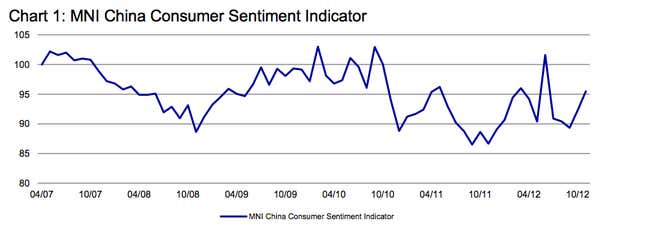Chinese consumers are becoming more confident again. According a survey released on Dec. 3rd by MNI, a market data firm, overall consumer sentiment rose for the second month in a row and one element of it, the readiness to buy durable goods, was at its highest in a year and a half (paywall).
But as MNI’s chart (below) shows, Chinese citizens are still only feeling as secure about making purchases as they were back in April. Their confidence is nowhere near the dizzy highs it reached in 2009-2010, when the Beijing government’s banks were pumping record amounts of credit into the economy to insulate China from the global slowdown. And that should be a clue to what’s actually going on.

Confidence is rising simply because the government has put its foot down hard on the stimulus pedal again. While Americans may believe the state should stay out of the economy, Chinese people assume the government is the economy, and there’s a strong link between government intervention and consumer confidence.
Likewise, expected stock market returns are not based on earnings forecasts, but on government measures to raise share prices. In October 2008, for example, the securities regulator prevented new IPOs in an attempt to raise company valuations.
House prices too tend to depend on how much the government is expected to support housing, and with good reason. When Beijing’s economic planners believe real-estate values have got too high, they simply turn off the credit tap to the sector by ordering state owned banks to cut lending to developers. In recent months, that lending spigot has been opened again. As one of MNI’s survey respondents says: “House prices won’t fall. The government won’t let this happen.”
In another sign of the stimulus, infrastructure investment is on the rise. And state-owned companies and local governments are issuing bonds heavily to fund new projects. Consumers’ increasing willingness to buy cars or refrigerators is probably a knock-on effect of that.
But some China watchers believe that state spending is not a sustainable way to keep China growing. Debt ratings agency S&P said back in August that more fiscal stimulus would be bad for China because such programs encourage money flows into unnecessary projects. In 2009-2010, China became cluttered with new airports and even some empty towns.
“Inefficient spending can impair China’s future growth trend,” S&P said in its August report. It added: “It could also deepen the damage of the last round of stimulus spending by further weakening the balance sheets of governments and commercial banks and raising future financing costs across the economy.”
That may be why some multinationals are feeling less positive about China than the country’s consumers are. Yesterday, Dow Chemical chief executive Andrew Liveris said he was more worried about the China slowdown than the US fiscal cliff. ”Markets have, in a holistic sense, really been suffering more from China’s slowdown than any slowdown here in the United States,” Liveris said, according to Reuters.
He said China’s recent appointment of new top leaders had created uncertainty in supply chains that had caused business activity to pause. He also forecast China’s GDP growth for 2013 could be as low as 6%. That contrasts with most economists’ expectations for around 7.5% expansion next year. One way to read Liveris’ comments, then, is that the Chinese government’s latest stimulus may be keeping consumers happy for now, but is unlikely to last into next year.
